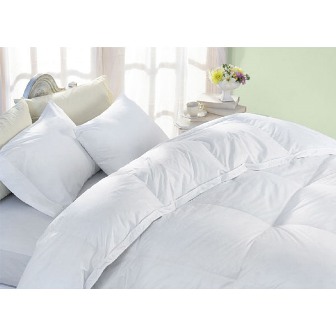Getting a good night’s sleep is important for everyone, but it’s something that those with allergies can struggle with. In order to sleep better, it is important that allergy sufferers take all possible measures to reduce their symptoms during the night. Part of that solution comes from purchasing hypoallergenic bedding.
Choosing Hypoallergenic Bedding
There are many different materials that are considered hypoallergenic including cotton, silk, some memory foam and polyester fiber. Natural materials such as cotton and silk are the least likely to contain allergens. Memory foam and many polyester fiber beads are made to be anti-microbial and resist dust mites. It is important to be careful that there aren’t other chemicals added that can trigger your allergies. If memory foam is compressed when you get it, make sure it is fully expanded and aired out before use.
Many people love the idea of a down comforter, and most don’t have a problem with it, but it may cause problems for some. In order to reduce the risk of allergens, look for a seal issued by the American Down and Feather Council (ADFC) which indicates that the down feathers were washed before being used as a filling.
Keeping Out Allergens
No matter how diligent you are about selecting hypoallergenic bedding, night time allergies can still sneak up on you unless you make a point to ban them. This means knowing what your allergies are and avoiding triggers.
Dust is a common allergen. In addition to choosing the right sheets, blankets, and pillows, dust-mite covers can make a big difference. Web M.D. reported that kids that used dust mite covers were able to cut their allergy medications in half. Dust mites may be small, but they are plentiful. Mattresses that are not protected from the mites can actually double in weight over ten years due to dust mites.
It is important to wash your bedding in hot water with detergents free of dyes and fragrances that may be triggers. Also look at what is in your room. If you have even the slightest allergy to your cat or dog they should stay out of your bedroom, and especially should stay off your bed. You’ll also want to make sure other triggers such as plants and flowers are not in the room.
Humidifiers can be a problem too, since standing water can attract mold. To avoid this, make sure water is changed often. There may be medication you can take, but some types can cause sleep difficulties which can be almost as disturbing as the allergies themselves.
When Allergy Sufferers Don’t Get Enough Sleep
Lack of sleep can be a serious problem for those with allergies as well as their partners. Allergies can sometimes stop up your nose forcing you to breathe through your mouth. This can trigger snoring and aggravate sleep apnea, reducing sleep quality for you both.
The National Sleep Foundation notes that allergy symptoms can greatly impact sleep quality and can spill over into several other areas of a person’s life. Sleep apnea, a condition that causes the throat to relax rather than hold the airway open is linked with allergies. Sleep apnea can lead to other serious chronic conditions such as heart disease, and they are at a higher risk of experiencing a stroke.
Lack of sleep in general can lead to overall fatigue, daytime sleepiness, decreased productivity, depression, problems with memory and trouble learning. Fighting off sleepiness can also lead to the overuse of caffeine or energy drinks.
Healthy Sleep for your Children
For children, a good night’s sleep is even more important, because in addition to the issues already mentioned, not getting enough sleep can cause poor school performance, lower I.Q. and has even been linked to brain damage, making it even more important for parents to monitor and do what they can to help their child sleep well.
+Paul Reichman BedBathStore offers an impressive variety of decor for all your homes room decorating needs at Bedbathstore.com
